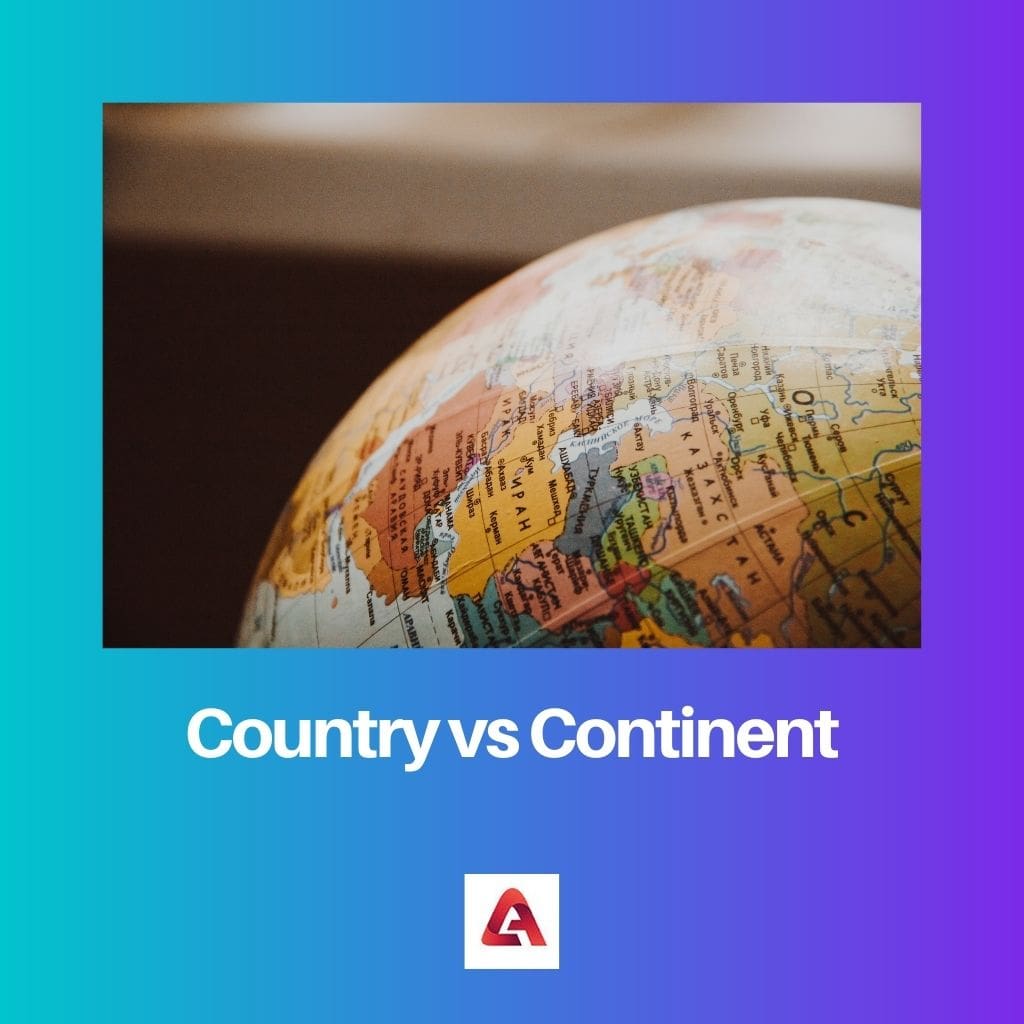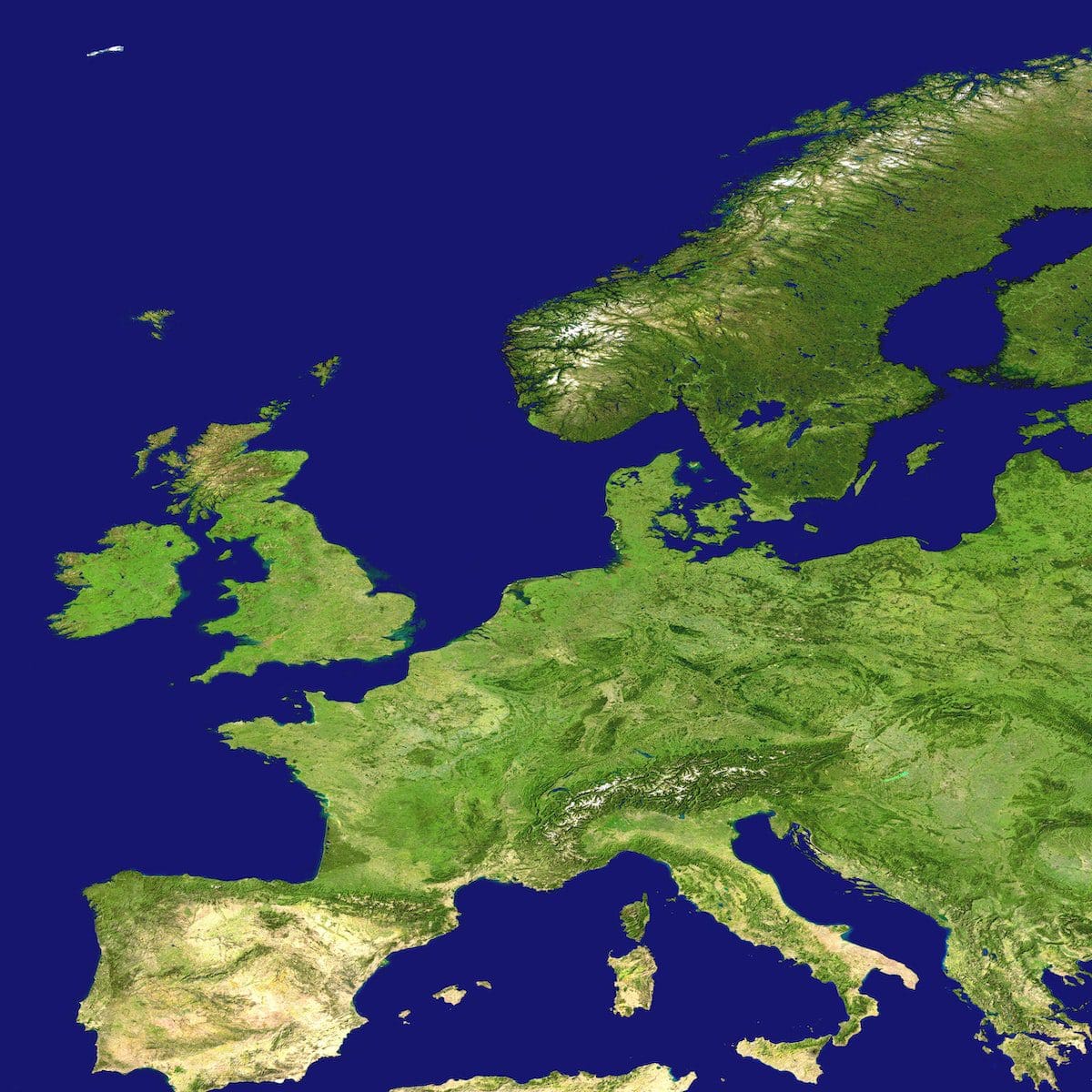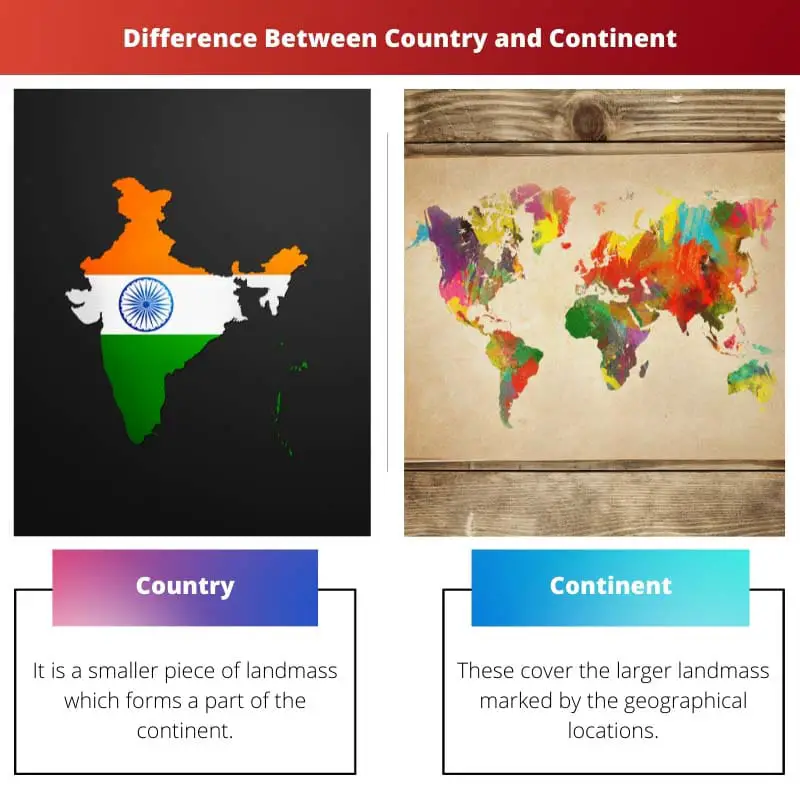The planet earth is so unique for life forms to exist. It is not only at the right distance from the sun but also has liquid water, making it ideal.
The water body and the landmass together form the world we live in, creating the imaginary boundary humans have created over the years.
The imaginary boundary thus forms a division of ethnicity, colour, customs, and history. Most world wars, the tiff between countries, and incursions result from imaginary boundaries.
Divisions allow diverse cultures and religions to live in peace, as most countries are a product of religious biases. There are about 195 countries recognized by the UN and 7 continents that house these countries.
Key Takeaways
- A country is a distinct political entity with its government, borders, and sovereignty, encompassing a specific geographical area and population.
- A continent is a large, continuous landmass on Earth, divided into smaller regions that can include multiple countries.
- Both countries and continents are geographical divisions, but they differ in scale and political organization, with countries being smaller, independent units and continents being larger landmasses encompassing multiple countries.
Country vs Continent
The difference between a Country and a Continent is that a country is an individual entity completely governed by discrete rules that apply just to the inhabitants. On the other hand, a continent is a culmination of countries formed just based on the water surrounding and the tectonic plates.

Comparison Table
| Parameter of Comparison | Country | Continent |
|---|---|---|
| Landmass | It is a smaller piece of landmass which forms a part of the continent, and often, the landmass changes with disputes and capturing of land. | These cover the larger landmass marked by the geographical locations. |
| Division\defined by | The boundary of a country is an imaginary line created through political tension or historical relevance. | A continent is a large continuous land identified with the water body around and, in this case, an ocean. |
| Characteristics | A country is governed or dictated by certain authority figures responsible for its future. | A continent is the culmination of countries and cannot be governed by just a few people except Australia and Antarctica. |
| Numbers | There are over countries, some are too small, as small as a city, while there are countries that are | There are 7 continents in total. |
| Nature | A country is an outcome of historic battles, faiths, or unity among the same thinking minds. | Exists independently in nature and are formed simultaneously as the earth evolves. |
What is Country?
A country is a bordered landmass sovereign in nature and restricted through an imaginary line that can be specific in some regions and uncertain in others.
The border can be natural dividers like a river, ocean, or mountain, they remain throughout history, and it’s easier to define a border through it. At the same time, the imaginary boundary can be debatable and create tension between the two parties.
The word derives from the French word ‘concrete’ meaning “spread before”, and is conveniently used to denote the political divisions created over the times and still in process.
The formation of countries results from the differences in ideology and identification of one’s narrative and historic symbology. It’s also the outcome of religious conflicts, which can assemble people.
A country can be divided and get dissolved, too, there are a total of 195 sovereign states as per the UN, and the number keeps changing. A country can be as small as 0.2 miles, the Vatican City, and as large as 6.6 million square miles, Russia.
A country can be governed through dictatorship or through the active involvement of the citizens too in choosing it.

What is Continent?
A continent is a large continuous landmass demarcated by naturally occurring and globally identified water body boundaries.
Though technically, a continent is identified through the rocks from which it is formed. Continents cover each landmass in the earth’s crust.
The word continent derives from the Latin word ‘Continentem’, which means “to hold together.”
Continents have evolved over the years; it is believed that all the continents were initially linked. The formation of continents is a naturally occurring process with tectonic plate shifts.
There are, in total, 7 continents, which include Asia, Africa, North America, South America, Antarctica, Europe, and Australia. Asia is the largest continent which is 44.58 million square kilometres.
Africa, which is confused as a country, houses the maximum number of countries compared to any continent.
A continent is not governed by a certain entity and has no sovereignty as a whole; it is not identified with religion or is formed on that basis rather it houses different thoughts, beliefs, and ethnicities sharing borders.



The post provides a simple and clear understanding of the difference between a country and a continent. It is quite informative and should be helpful for those looking to understand this concept better.
I agree, the explanation is easy to understand and sheds light on some crucial differences between countries and continents.
This post is a valuable resource for those seeking an in-depth understanding of geography and its many complexities.
The way the difference between a country and a continent has been explained in this post is just brilliant. It’s a commendable piece of work, presenting complex geographical concepts in a simple, digestible format.
I couldn’t agree more, this article does justice to the topic by laying out the differences so clearly and comprehensively.
Absolutely, the clarity and insights provided in this article are top-notch. It’s a job well done by the writer.
The information shared here is highly informative and beneficial for anyone wishing to expand their knowledge in geography. The way it demystifies the differences between countries and continents is truly commendable.
I couldn’t agree more, Jayden. This article provides a comprehensive and clear understanding of the complexities surrounding countries and continents.
Absolutely, this article takes a complex subject and breaks it down into an easily understandable post. Kudos to the writer!
The post highlights the importance of understanding the differences between countries and continents, delivering great value to anyone seeking knowledge on the subject.
Indeed, it serves as a valuable piece of information for students, teachers, and anyone studying geography.
The post wonderfully presents the distinctions between countries and continents, offering a wealth of knowledge in an articulate, clear manner. A must-read for anyone curious about geography!
Absolutely, the insights provided in this article are of great value for anyone aiming to enhance their understanding of countries and continents.
The clarity and precision of the information in this post are truly praiseworthy. It is an informative and enlightening read for anyone interested in deepening their knowledge of geography.
Totally agree, Martin. The article is a treasure trove of knowledge, providing a thorough grasp of the intricate differences between countries and continents.
Fantastic information provided in this post, very enlightening and well-composed. It serves as an excellent reference for those interested in understanding geography.
The information provided in this post is quite enlightening. It offers a comprehensive understanding of the differences between countries and continents and should be lauded for its clarity and conciseness.
Yes, I found the information to be very educational and beneficial for those who want to have a clear concept about the topic.
The depth of knowledge offered in this post is truly impressive. It’s a valuable read for anyone seeking to gain a profound understanding of the disparities between countries and continents.
Absolutely, the information is presented in such an accessible manner, making it an indispensable resource for anyone keen to comprehend the nuances of countries and continents.
This post conveniently demarcates the distinction between a country and a continent using a lucid, easy-to-understand language that’s highly beneficial for anyone interested in geography. Thumbs up for such a well-composed piece!
Completely agreed, this article has done an excellent job of breaking down the intricate details regarding countries and continents.
You’re right, Quentin. It’s refreshing to come across a post that presents such complex information in a comprehensive and intelligible way.